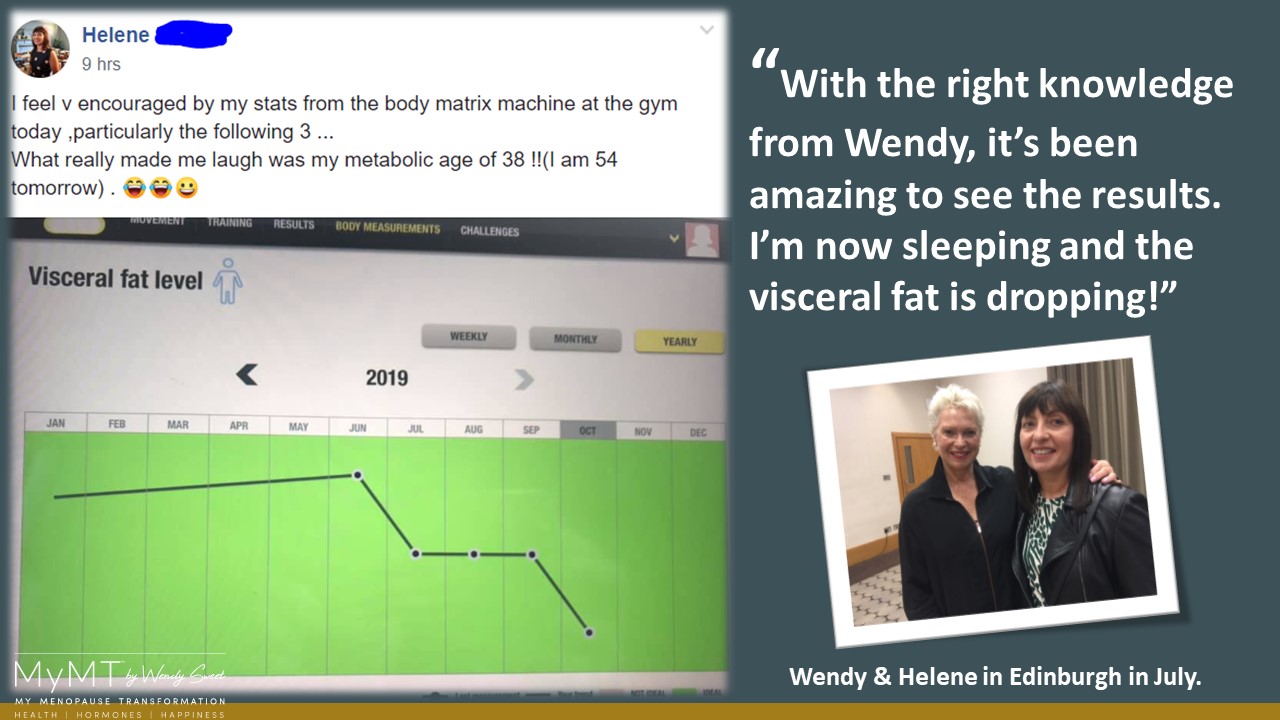There isn’t a lot of emphasis on exercise in the Transform Me weight loss programme. And yes, I know this sounds counter-intuitive to a generation of women who’ve been bought up on the notion that lots of exercise will help them to lose weight. But when we don’t sleep all night, the weight around the middle can keep creeping up and up and up – so too can your cortisol levels and joint and muscle inflammation.
Before you know it, you’ve reached your 60’s and there’s a spare tyre around your middle that just might send you down the slippery slope towards heart disease and joint and muscle pain that gets quickly labelled as fibro-myalgia. Your ‘healthy-ageing’ just took a step or two backwards.
It’s been 4 months since Helene joined me on the MyMT™ Transform Me programme.
It was such a pleasure to meet her when I was in beautiful Edinburgh in July earlier this year. We chatted away and she told me she was ‘between jobs’ so had a bit more time to focus on her health. When I asked if she was sleeping, the answer was the same the world over – “I’m awake between 2-4am.” I explained that until she slept all night, her weight would keep creeping up. It’s part of our ancient, biological survival mechanism. When our body is stressed from not sleeping, we store more fat in our trunk area. But this is the deep, visceral fat which is unhealthy for our heart and accelerates our trajectory towards age-related obesity.
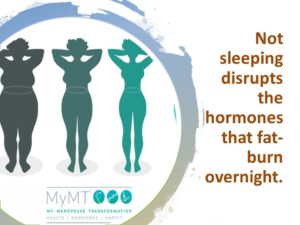
That’s why, before women get stuck into too much exercise, I focus them on sleeping first, as well as changing their nutrition to support hormonal changes in menopause. Then they add back in the right exercise to reduce the visceral fat. How exciting that Helene has done exactly this! When she posted this on the private coaching group, I asked her if I could share it with you all too.
“With the right knowledge from Wendy, it’s been amazing to see the results. I’m now sleeping and the visceral fat is dropping! According to the machine at the gym, I’m younger too.”
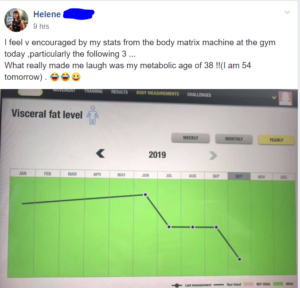
As I write this post for you all, I’m reminded of my doctoral studies. For over 6 years, I had my head in women’s healthy ageing research. When I interviewed women for my studies, they had positioned their healthy ageing in the context of doing lots of exercise. However, not many of them were sleeping well. Their stories were replete with a love of exercise, but also sore muscles and knees, weight that wasn’t shifting, and for many, whilst they loved the exercise they were doing and the company they kept, they had become frustrated with numerous health episodes that were slowing them down. Reports of increased fatigue, sore joints, injured hips, plantar fasciitis, high cholesterol and for many, the dreaded weight gain, meant that I began to explore this more thoroughly. You see I was experiencing the same issues too. By the time I got to the end of my studies, I realised that not one of them, nor their health providers, had mentioned menopause. Many women on the MyMT™ programmes report similar experiences and yes, it was the same for me too.
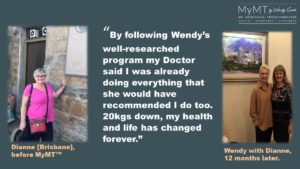 Although exercise is a marker of ‘health’, it’s only one parameter in the ‘healthy ageing’ story for women.
Although exercise is a marker of ‘health’, it’s only one parameter in the ‘healthy ageing’ story for women.
Two of the most important parameters of ‘health’ as we go through menopause is not just exercise – it’s sleeping all night AND reducing inflammation that has been building up for years.
If we aren’t sleeping and we have pockets of inflammation inside our joints, gut, liver, pancreas and muscles, then this increases our chronic stress hormone called cortisol. When cortisol is higher than it should be in mid-life (and this can become worse when we aren’t sleeping and over-excercising), then we begin to experience a multitude of health issues. For women, this is often the auto-immune muscular condition known as fibro-myalgia. But it could also be weight gain, hypertension (high blood pressure), increased hot flushes (as the body tries to cool down) and for those who are regular exercisers, the injury rate can increase as well.
Ageing-well is an interesting topic. It seems that everyone has their opinions of what this means and what is required. But ‘ageing well’ is a term that sits within longevity research. From an academic perspective, it has many dimensions, especially for women. I explain this in my seminars, because too many women think that to feel younger, they need to go on crazy high fat and high protein diets or do lots of exercise. I see these women at the gym – they become evangelists for whatever is the diet or exercise regime of the moment. I used to be one of these women too. But the more I did my studies and positioned menopause in women’s healthy ageing research, the more I began to understand that notions of ‘ageing well’ were not well known in the fitness, sporting or dieting industries. That’s because menopause and healthy ageing, isn’t part of academic curricula for many exercise professionals, sports coaches or nutritionists. I know this, because here in New Zealand, I looked at these courses. Menopause was missing. That’s why on the 12 week MyMT™ programmes I’ve taken research from many academic disciplines and pulled this information into the programmes.
If 50 really is the new 40, then, as Helene discovered, it requires the right knowledge for our age and stage. 🙂
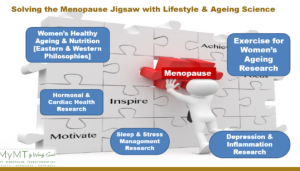
I was so pleased when Helene came to my seminar in Edinburgh. She learnt that when our lives are still so busy and our hormones are changing as we age, it’s important to get our sleep sorted. This is necessary in order to shift our abdominal fat. I can’t reiterate this enough. As I often describe in the programmes and at my seminars, when we have been waking up night after night, then our brain and body reads this as our ‘new normal’. However, this leads us down the path of inflammation. Not sleeping is now recognised as one of the main contributing factors to changing health as we move into our post-menopause years and it contributes to heart disease too. Both Scotland and New Zealand have some of the highest incidence of post-menopause heart disease. If we aren’t sleeping, our heart and immune system stay under stress all day long, particularly, when we are regular exercisers or we have busy, stressful jobs or home environments. This increases our risk for heart disease as we get older. For women during menopause, it also increases our risk of weight gain.
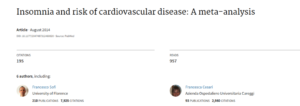
How does our body heal overnight?
Have you ever wondered why we are programmed to sleep? I became curious about this when I wasn’t sleeping during menopause too. It was driving me insane, literally. I knew that my body wasn’t healing and recovering overnight and not sleeping was leaving me too exhausted to recover from the exercise I love to do. I began to lose confidence in every being able to turn this around and yes, I was talking HRT and numerous supplements as many women do. At the time however, I didn’t understand that not sleeping was blocking fat-loss mechanisms overnight and worsening insomnia was exacerbating causing increased hot flushes too. When we don’t sleep, our thyroid metabolism which controls blood pressure and temperature gets out of balance too.
When cortisol is high, it blocks the production of our sleep hormone melatonin so either we have trouble getting off to sleep or we wake up in the night and can’t get back to sleep. I talk a lot about cortisol during my seminars. As we move into menopause, it’s this hormone which needs to be settled down. Cortisol is one of our chronic stress hormones and it’s important to women in menopause who aren’t sleeping, because it works in synergy or partnership with our sleep hormone melatonin.
If cortisol levels are too high when we go to bed, then we don’t produce enough melatonin to keep us asleep for the healing hours of between 2-4am. This is the time of night when our immune system is working hard to restore our body ready for the next day.
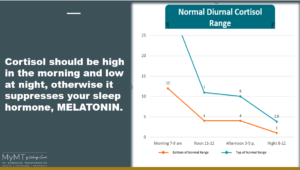
I also worry about women diagnosed with fibromyalgia in their 50’s.
“Our capacity to remain healthy is badly affected by loss of sleep and sense of comfort” reports researchers who have looked at the role of sleep on the immune system. (Asif, et al. 2017). This study reports that our white blood cells, called leukocytes, don’t reach the levels that they should due to lack of sleep and this makes us vulnerable to sickness, flu and immune system health changes. For women in menopause, this can lead to the autoimmune problem of fibromyalgia. This is a condition whereby women experience various specific ‘hot-spots’ or trigger pain-points in muscles and have muscular aches and painful, stiff joints. You must get this checked out with your Doctor, because this is an autoimmune condition that sends mid-life women down the slippery path towards higher cortisol and more internal inflammation. Increased cortisol however, pushes lovely anti-inflammatory progesterone out of the hormonal pathway, so ladies, here’s a hint from me if you have fibro-myalgia, get your progesterone levels checked and sort your sleep out as well.
[Image Source: Adam Medical Images]
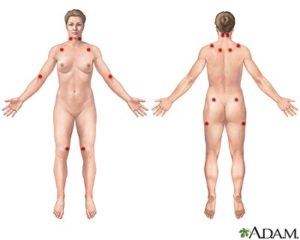
I talk a lot about inflammation and cortisol and how to manage these in the MyMT™ programmes.
The importance of this came to me in my own studies, but also through the work of Professors Garry Egger and John Dixon (2009). As I positioned menopause in our biological ageing, I began to understand that ageing itself is inflammatory. Couple this with menopause-related insomnia, then it becomes a perfect storm for our health and weight changing for the worse as we move through menopause and out into our 60’s. Our mother’s generation has already discovered this too.
You can see from the image below, the characteristics of both pro- and anti-inflammatory influences. From an evolutionary perspective, a variety of stimuli keep us in the ‘inflammaging cycle’ and I include menopause-related hormone changes in this too. For too long, menopause has been viewed through the lens of our changing ovaries, and only through medicine, but my own studies showed that this is not helpful. In fact, it’s why I got off HRT and endless expensive supplements that are not well evidenced in women’s healthy ageing research. There is more to menopause than ‘just our ovaries’. This life stage is programmed into our brain and body and needs to be viewed through the lens of ageing and the incredible changes that occur in our muscles, heart, blood vessels, skin liver, gallbladder, pancreas and gut as we age. All these areas lose the role of oestrogen as well and as Professor Egger rightly states,
“We have been operating in silo’s. We haven’t been taking into account all the other effects on inflammation, including ageing.”
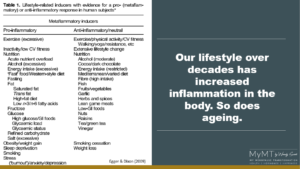
So what do we do to turn around ‘inflammaging’ and as Helene has done, to lose weight and turn back the biological clock?
Well, here’s a couple of strategies from the MyMT™ Transform Me weight loss programme:
- Switch the timing of your protein, so that you aren’t having as much at night. Too much protein is ‘thermo-genic’ (heat generating) and this increases your blood pressure, which in turn increases our thyroid metabolism which prevents us sleeping.
- Restore liver health so that your liver can help your fat cells reduce the build-up of excess oestrogens in your body. Inflammatory changes begin in the liver and for women going through menopause, who are putting on belly fat and the deep visceral fat is increasing, then your liver needs to help you clear the excess. Click through as I have written about the LIVER in this blog.
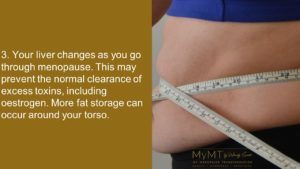
Without a doubt, how our society is ageing has become a very real focus for governments around the world. What’s concerning me however, is that for women in mid-life, enough attention isn’t being given to how we are ageing.
During menopause, our body is undergoing numerous changes that impact on our joints, muscles, mental health, cardiac health and weight. One of the most challenging issues that I came across in my own studies was that mid-life (which starts in our mid-40’s) is the time when very quickly, we can tip-over into changing health. So, this is the time to change our lifestyle, not when we are 70!
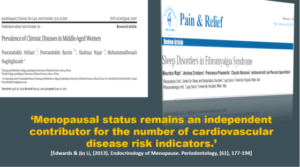
For women coming to join me on the online MyMT programmes I coach them how to do this by first and foremost, getting them to sleep all night, improving liver health, and having specific nutrients that help to reduce inflammation in our body as we age. This includes foods such as beets and celery, which help to improve blood pressure control and from following the best diet that has been researched for improving women’s health as they age – the Mediterranean diet.
That’s why, not only was Helene in Edinburgh happy but so too was Jennie from Nova Scotia all the way over there in Canada. I also loved this email I got from Jennie this morning too. (22 lbs is around 10 kg).
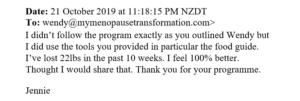
As I often say to women who join me from all around the world, we might all live in different locations, but we are connected via menopause and my passion is to change the conversation about this important life-stage! When you can, I would love to support you too.
Wendy Sweet, PhD/ Women’s Healthy Ageing Researcher & Founder of MyMT™.
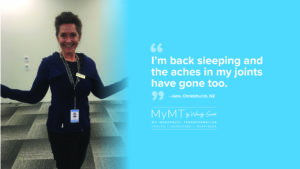
References:
Asif N., Iqbal R., et. al. (2017). Human immune system during sleep. American J. Clin Exp Immunol.,6 (6):92-96
Egger, G. & Dixon, J. (2009). Obesity and chronic disease: always offender or often just accomplice. British Journal of Nutrition, 102, 1238-1242.
Franceschi, C. et al. (2018) Inflammaging: a new immune-metabolic viewpoint for age-related diseases. Nat. Rev Endocrinology, 14(10):576-590.
